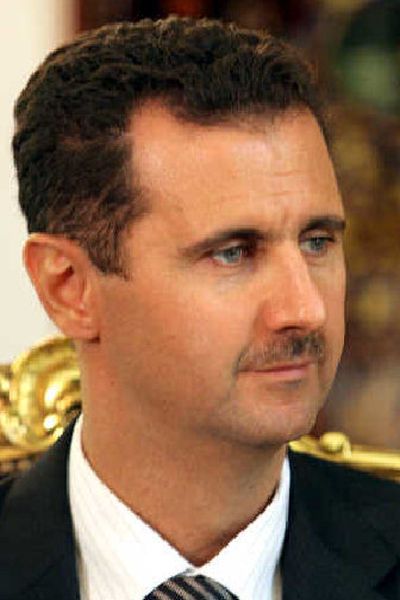U.S. frustrated with Syria

WASHINGTON – President Bush and his top aides are weighing new steps against Syria, according to U.S. officials involved in Middle East policy.
Bush’s national security team met Saturday to review policy toward Syria, the officials said. Options range from tougher economic sanctions to limited military action. One official involved in the deliberations said military action is unlikely for now.
However, one option under consideration was bombing several villages 30-40 miles inside Syria that some officials believe have been harboring Iraqi insurgents. The officials said the U.S. government has complained to the Syrian government about the matter, but not received a satisfactory response.
One other official, however, said that military and other intelligence officers say the intelligence on the insurgents’ presence in the villages is “not unambiguous.” They said it is not clear whether the insurgents are present as a matter of Syrian government policy, local or tribal hospitality or simply because insurgents have intimidated villagers.
The proposal to take military action, the officials said, reflects the military’s increasing frustration with its inability to defeat the insurgency and stop the flow of foreign terrorists into Iraq.
The officials spoke on condition of anonymity because the plans are highly classified and no decisions had yet been made on whether to adopt them. It wasn’t clear whether they were speaking publicly of possible action in an effort to put more pressure on the Syrian government to crack down on insurgent activity along the border.
The White House declined to comment Saturday when asked about the meeting.
Bush discussed the war in Iraq and made reference to Syria in his weekly Saturday radio address.
“Our strategy in Iraq is clear,” Bush said. “We’re hunting down deadly terrorist leaders. We’re conducting aggressive counterterrorism operations in the areas where the terrorists are concentrated. We are constantly adapting our tactics to the changing tactics of the terrorists. And we’re training more Iraqi forces to assume increasing responsibility for their country’s security.
“… And coalition and Iraqi troops are pursuing the terrorists in western Iraq, working to deny al-Qaida a safe haven there, and to stop terrorists from crossing into the country through Syria,” Bush said.
The meeting came as a United Nations investigator nears completion of a report that’s expected to provide evidence that Syrian security agencies were involved in the February assassination of former Lebanese Prime Minister Rafik Hariri.
The investigator, German prosecutor Detlev Mehlis, is drawing on debriefings from one or more defectors from the regime of Syrian President Bashar Assad. The defectors have provided evidence of Syrian government complicity in Hariri’s death, according to two U.S. officials.
The U.S. government also has accused Syria of allowing insurgents to cross its territory and enter Iraq and recently has ratcheted up its demands that the traffic be halted.
U.S. Ambassador to Iraq Zalmay Khalilzad warned in mid-September that “our patience is running out.”
“There’s sort of a sense that the Syrians have to get serious about shutting down these pipelines,” a senior administration official said Friday, describing two major routes by which insurgents cross from Syria into Iraq.
The U.S. officials who discussed policy toward Syria requested anonymity because they weren’t authorized to speak on the matter, and the Bush administration discourages public airing of its foreign policy deliberations.
Syria represents a complex challenge for Bush and his national security team as they wrestle with the war in Iraq.
There’s disagreement within the Bush administration over the extent of the Syrian regime’s backing of the Iraqi insurgency, support that Syria denies. The CIA and Defense Intelligence Agency have reported that the evidence is inconclusive, one official said.
Others argue that military action could destabilize or even topple Assad’s government, with no good replacement at hand.
Since Hariri’s assassination, Bush has pursued a policy of increasing pressure on Syria, with backing from the international community.
“It’s an undeclared posture of ‘regime change’ on the cheap,” said Flynt Leverett, a former CIA analyst and author of a recent book on Assad. The administration hopes to topple Assad without resorting to a costly invasion as in Iraq, Leverett said.
The options on the table for Saturday’s high-level White House meeting included imposing more sanctions on Syria, authorized under the 2003 Syria Accountability Act; reaching out to Syrian opposition groups; and taking limited military action, such as the use of U.S. special forces, to stop the flow of insurgents, according to an official involved in the deliberations.
The Bush administration, he said, calculates that the Mehlis investigation is putting significant pressure on Assad and is helping to build an international consensus to isolate Syria. “We don’t want to blow that,” he said, in explaining why military action isn’t likely now.
Another official said that U.S. ally Israel also is counseling restraint, arguing that any successor to Assad, a member of Syria’s Alawite minority, would likely be worse – perhaps even ushering in a militantly Islamic regime.
Mehlis is due to make his findings public in late October, although U.S. officials say they expect any final report will be delayed until next year.